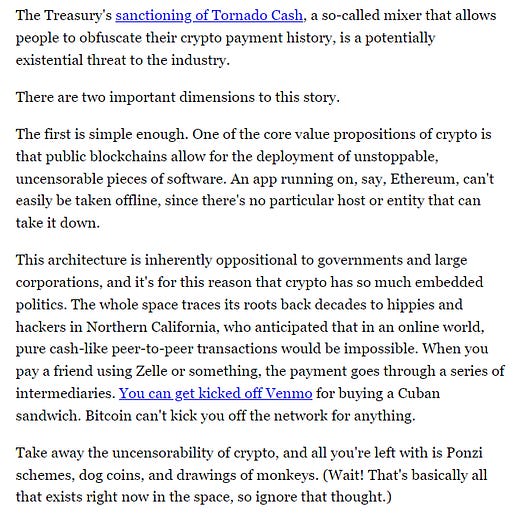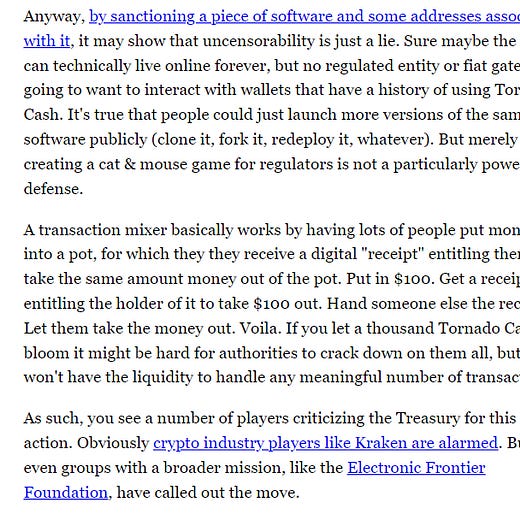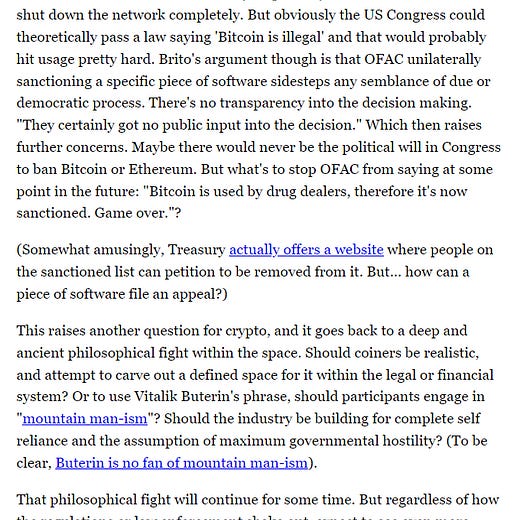In sanctioning Tornado Cash itself OFAC may have exceeded its authority
It has now been two weeks since the Treasury’s Office of Foreign Assets Control sanctioned “Tornado Cash” and several associated ethereum addresses.
Read last week’s newsletter to catch up on what we’ve already done.
This week we published a much more in-depth legal analysis of OFAC’s action.
Read more: Analysis: What is and what is not a sanctionable entity in the Tornado Cash case
We distinguish a potentially sanctionable Tornado Cash entity and the autonomous smart contract Tornado Cash itself. We argue that by treating the autonomous code as a “person” OFAC has exceeded its statutory authority.
In the present case, the sanction is accomplishing something very different; it’s saying Americans can’t even make use of intellectual property in which the authors have no economic interest. For one thing, the software in question has been released under open source licenses so no American has in the past, or will in the future, pay any license to any author (irrespective of whether those authors are sanctioned). Additionally, the copies of the software already reside on the home computers of anyone who connects to the Ethereum network. The appropriate metaphor for this sanction, therefore, is as if an Iranian author has been sanctioned and, therefore, Americans who already own copies of his book must refrain from reading that book. Similarly, we believe OFAC’s designation is also unlawful because it exceeds its authority under the Executive Order given that the associated addresses are not “persons” as defined in that order, for the reasons we explain above.
There is a complex argument made about de facto licensing regimes and unchecked administrative authority. Joe Weisenthal at Bloomberg boiled it down:
Jerry Brito and Peter Van Valkenburgh dusted off the Coin Center podcast Tangents to discuss the arguments we make. Links to listen are here. And here’s the video version:
And Jerry appeared on ReasonTV for an 11 minute summary of the civil liberties issues at play.
Finally, we participated in a Twitter space hosted by our friends at Espresso Systems to take community questions. Listen to the recording here:
Our analysis ends with a summary of our next steps:
First, we will seek to engage OFAC, share our views, and hopefully hear theirs. We have also had inquiries from members of Congress about the situation and we will continue to brief interested parties there.
Second, there are innocent Americans who have funds trapped at listed Tornado Cash addresses. We will do our best to help them apply for a license to withdraw those funds. In addition, the DeFi Education Fund has announced that it will be petitioning OFAC to issue a “general license” that would cover all affected persons without each having to file individually and we will support that effort.
Finally, we will begin exploring with counsel a court challenge to this action. Stay tuned.
We are grateful for the outpouring of support from the community and the wide sharing of our arguments. We are still in the exploratory phase of a legal challenge. In particular if you are an American who used Tornado Cash, we want to hear from you.
If you want to support our work, please consider donating: coincenter.org/donate





